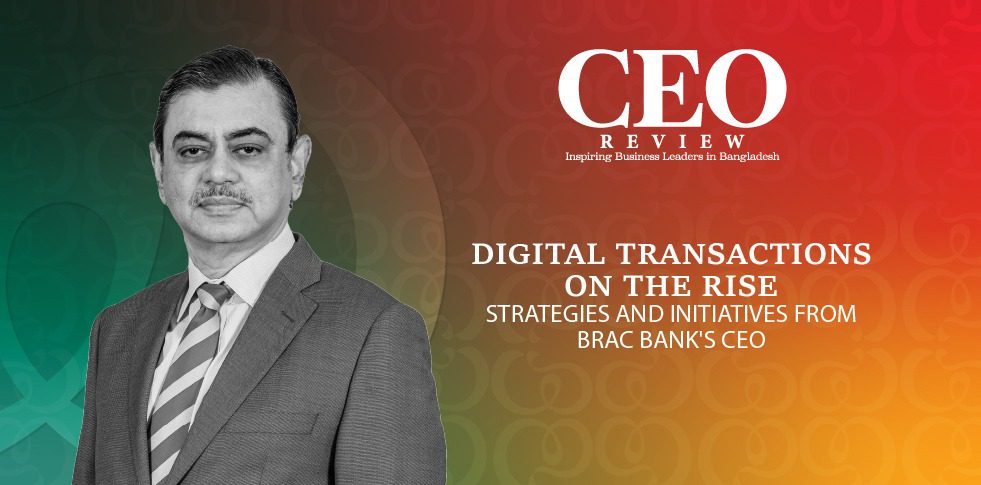Selim R. F. Hussain is the Managing Director and CEO of BRAC Bank. Recently, In a conversation with CEO Review, he delved into Bangladesh’s remarkable journey towards a cashless economy. Hussain highlighted the nation’s rapid digital advancements and shared insights on the innovative strategies and collaborative efforts driving this transformation. Additionally, he spoke about BRAC Bank’s pivotal role in fostering a digitally empowered society.
CEO Review: What progress has Bangladesh made in its transition towards a cashless economy?
Selim R. F. Hussain: Bangladesh has made incredible strides towards creating a cashless economy over the years. The government and financial institutions are implementing numerous plans to encourage digital payments. These days, customers use banks’ apps and mobile financial services (MFS) like bKash, Nagad for cashless payments and transactions. Digital transactions are becoming popular daily, and people increasingly prefer cards, mobile apps, and MFS wallets instead of cash payments for greater convenience.
Bangladesh Bank’s ‘Bangla QR’ is the QR code-based universal payment system that allows anyone to make payments using the mobile app from their bank or MFS. Customers can also rapidly and digitally transfer money using Bangladesh Bank’s other interoperable systems, such as NPSB, RTGS, and BEFTN; this has created great convenience for customers since they can easily do transactions without travelling. These initiatives have also eliminated the dependency on physical premises.
What strategies can be implemented to enhance this progress?
Selim R. F. Hussain: Well, initially, the internet connectivity needs to be high-speed so that transactions will not be delayed. This will help enhance customer experience and eliminate the fear of transaction loss. Next, we need to ensure free or low-cost data connectivity for digital transactions. Financial institutions, mobile operators, and the government may provide free or low-cost data connectivity for digital payments to citizens. Reduced data rates for using payment services would facilitate the adoption of cashless technology and increase the number of individuals working in the formal sector. Moving on, a smartphone is necessary for digital payments such as QR transactions, mobile apps, etc. Nonetheless, a sizable portion of our nation’s population still uses outdated button phones. Financial institutions and cellular service providers could collaborate to offer consumers loans to purchase smartphones. The government may also adopt the appropriate measures to lower the cost of smartphones. Then, to change consumer behaviour, incentives and promotional offers should be created to make cash payments expensive and give customers additional savings or benefits for digital payments. Lastly, and most importantly, cybersecurity is essential to guaranteeing the security of digital payment systems. With the increasing use of digital payment systems, hackers are developing new strategies to target weaknesses and steal private data. Government and financial institutions must implement appropriate protocols to avert cyberattacks and safeguard client information and funds. Bangladesh Bank may develop a central cybersecurity forum/consortium comprising representatives from different financial institutes, MFS, and regulatory and cybersecurity experts. This forum will alert all related industries regarding the potential upcoming cyber threats and share knowledge on how those potential threats can be better managed.
How does your organisation contribute to advancing toward a cashless economy?
Selim R. F. Hussain: BRAC Bank works closely with its customers, partners, regulators, and government to advance toward a cashless economy. It has played a leading role in every initiative by the Bangladesh Bank toward digital payment.
As a pioneering bank, we have introduced unique digital initiatives such as Bangla QR, Binimoy, and TakaPay payment schemes. Our app ‘Astha’ offers charge-free data and the highest fund transfer limit, promoting digital transactions. We issue dual-interface cards for convenient transactions and provide attractive discounts and cashback offers to our cardholders and app users, further encouraging cashless transactions.
Our internet banking platform for corporate and commercial customers, ‘CORPnet’, provides seamless transaction banking services with a straight-through payment facility. The bank has already established API connectivity with the National Board of Revenue, WASA, City Corporation, and other entities to facilitate digital bill and fee payments. Our customers enjoy e-commerce payment through VISA and MasterCard using our state-of-the-art Online Merchant Service Portal.
As a leader, we have connected to most MFS providers, offering customers the convenience of transferring funds between their bank account and MFS wallet, reducing the need for cash transactions. We witness high usage of this service(s) every month, which is growing. We also offer corporates the option to pay salaries to their workers through bank to bKash, contributing to reducing cash transactions.
BRAC Bank has launched the ‘Smart Farmer’s Card’ to facilitate digital banking for farmers. We have also participated in the Eid-ul-Azha cattle markets’ ‘Smart Haat’ initiative, offering digital services to cattle buyers and sellers to promote digital transactions.
BRAC Bank is steadfast in its commitment to advancing towards a cashless economy. Our continuous efforts in this direction demonstrate our dedication to promoting digital transactions and reducing the reliance on cash. ■

